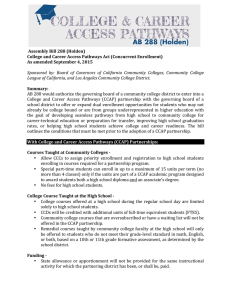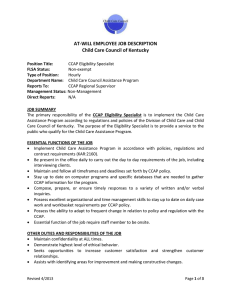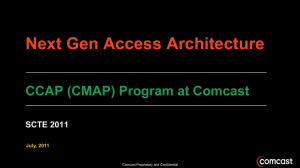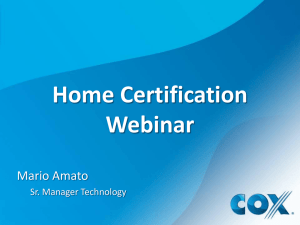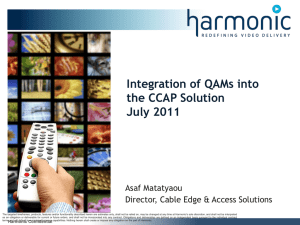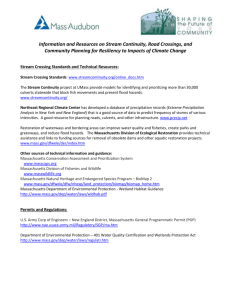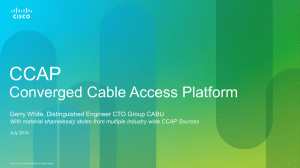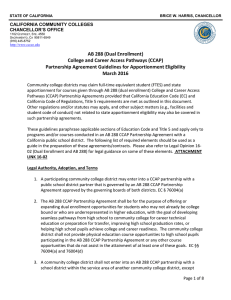Are you ready?
advertisement
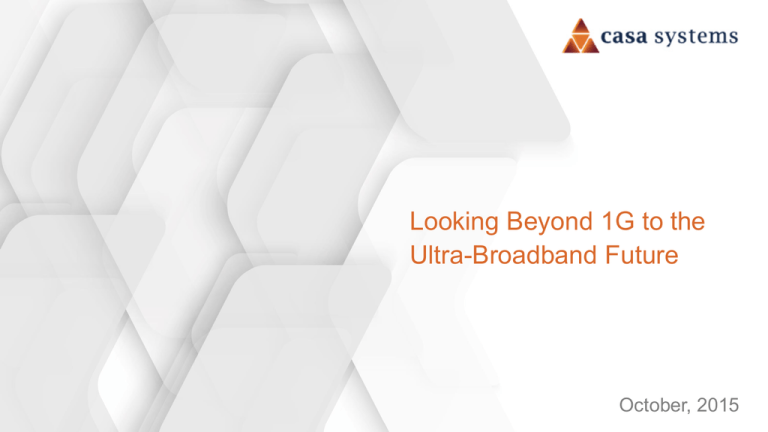
Looking Beyond 1G to the Ultra-Broadband Future October, 2015 The Future = More More Connections 20 15 10 5 0 2014 2019 Connected devices per consumer Mobile Traffic 200 175 150 125 100 75 50 25 0 2014 IP Traffic 2017 2020 IP traffic per capita Consumer Electronics and M2M 15 Billions of Connected Devices 25 Exabytes of Traffic Per Month Billions of Connected Devices 30 More Broadband Uses More Traffic 10 2014 2020 2014 (3) (7) (8GB) Sources: Ericsson Mobility Report, Cisco VNI 2019 5 0 2015 2020 (22GB) 2 And, Less • Service Provider consolidation = fewer but stronger competitors Fewer distinct end to end networks – all IP • SDV CCAP • VOD Less user tolerance for poor experience 1 • HSD IDC Research 2 American Customer Satisfaction Index • • 100 telecommunications M&A activities in 20141 Increasing number of cable acquisitions of telco assets and vice versa Consolidation of data, voice and video onto CCAP platforms Convergence of fixed and mobile core networks Average % satisfied of Americans satisfied with Pay TV service declined from 65% to 63% from 2014 – 20152 More choices can = higher defection rates 3 Ultra-Broadband Vision Trusted W-Fi Untrusted Wi-Fi Security Speed Duration 2/3/4/5G Cellular Ethernet DSL DOCSIS Reliability Mobility Latency PON Expanding quantity and variety of broadband network connections Seamless access networks Software defined network parameters Unique, ubiquitous ultra-broadband experiences 4 A Decade of Revolution Ahead Burgeoning Global Demand for Broadband Services • • • 10X mobile broadband traffic 2014 – 20201 3 connected devices per man, woman, child by 20192 2 ZB global IP traffic in 2019 (66X that of 2005)2 Service Providers Fighting for Relevance & Profitability • • • 100 telecommunications M&A activities in 20143 Competition between telcos and MSOs accelerates Increasing OTT and service provider partnerships 40 years of IT innovation will happen in 10 years in cable & telecom networks • AT&T’s John Donovan: “by 2020, 75% of network functions will be virtualized” 60% of service providers say SDN / NFV are essential technologies over next 5 years4 • Sources: 1 Ericsson Mobility Report, June 2015; 2 Cisco VNI Report, 2015; 3 IDC Research; 4 Heavy Reading 5 5 Key Trends 1 Access network densification: geometric growth in number of access end points to meet broadband coverage and capacity demands 2 Network convergence: fixed and mobile networks integrating to provide ubiquitous ultra-broadband services 3 Service provider convergence: providers expand portfolios into adjacent domains (cable for MSOs; mobile for MNOs) organically or through M&A 4 Network transformation: service providers re-thinking architectures and moving quickly toward cloud + SDN / NFV for networks and data centers 5 Programmable Networks: resultant transformed networks enable exponential growth in offerings from service providers to end users and third parties Proprietary / Company Confidential 6 5 Transformative Steps Monetizing network investments Wi-Fi@ Home Beyond 1G Speeds Enterprise Services Mobility, Voice M2M IPTV Anywhere Virtualize Distribute Upgrade Consolidate • Video + HSD on CCAP to save OPEX today, smooth path to all-IP • Leverage CMTS for Wi-Fi vs. an overlay network • Upgrade CCAP to D3.1, leverage channel bonding • Make full use of spectrum, boost speeds to 10Gbps Meeting today’s throughput and QoS demands • Push access to demand hot spots and enterprises with R-PHY, leveraging deep fiber assets • Add Wi-Fi with dormant small cells to support VoWi-Fi and enable SCaaS • Virtualize network functions where it makes sense to do so • Use SDN to deliver new services, faster UBB Anywhere Integrate • Full convergence of services across fixed and mobile via Software Defined Ultra-Broadband • Deeper enterprise services • Residential stickiness through branded services anywhere Evolving networks to deliver ultra-broadband everywhere7 Consolidate to C100G CCAP Multiple Services, One Platform IPTV VoIP CMTS HSD IPTV VoIP CMTS HSD Linear VoD VoD EQAM Linear NPV R Broadcast EQAM SDV EQAM C100G • HSD, video and voice over one platform; single port per SG • Universal QAMs support all video services • Full suite of IP Routing protocols for easy migration to IPTV • Subscriber and traffic management and control • True software defined cable ‒ VoD NPV R Universal EQAM • • • Only Casa Systems programs own CCAP chips using FPGAs for more flexibility, faster TTM, lower cost Energy, facilities and OPEX savings Simplified operations Faster trouble shooting, higher customer satisfaction ‒ Repurpose or move QAMS with keystrokes in minutes Casa Systems’ C100G delivers full convergence of IP and video services on one platform 8 Upgrade: 32 Channel Bonding, DOCSIS 3.1 • 32 channel bonding available for D3.0 or D3.1 • Full US and DS available for D3.1 - No field upgrades required • 128 channels / SG supported today • Faster DS and US speeds ‒ 1Gbps x 100Mbps NOW ‒ Smooth scaling to 10Gbps in 2016 140 120 100 80 60 64 40 20 0 16 16 48 NC QAMs (DOCSIS or video) plus 128 shared channels (for video) 1x192 MHz block 56 16 24 64 NC QAMs plus 192 shared channels (for video) 1x192 MHz block 1x192 MHz block 32 56 48 Broadcast video 32 16 8 24 24 32 32 32 32 Full DOCSIS 3.1 available from Casa Systems in 2015 – Why wait for DOCSIS 3.1 VOD/SDV DOCSIS 3.0 C100G supports all channel types 9 gigabit services? today Distribute Cable Access with R-PHY and PON • Standards-based approach within the CCAP framework CSC8x10G - - RCN RCN RCN RCN DOCSIS and EdgeQAM PHY to the fiber node via Remote CCAP Phy Node (RCN) + CCAP Service Card (CSC8x10G) MAC and higher layer intelligence in the headend/hub where it can later be virtualized Headend/hub and Remote PHY are connected via 10G optics (ethernet or PON) Supports all CCAP services; managed like current CCAP devices; reuse existing infrastructure No change to CM/STBs • Allows bandwidth growth while reducing space and power needs in headend/hub - - Replaces high cost analog optics with lower cost digital optics Reducing RF cascading increases SNR - higher modulation (4096QAM) can be achieved Scalable PON solution – 16 10G per card Cost effectively expand solutions requiring higher bandwidths to enterprises, consumers 10 Add Wi-Fi and Small Cells OA&M IP Services OA&M IP Services AP (NAT, IPv4 IPv6, DHCP, FW) MultiAccess SeGW Connected Home CCAP CMTS WLAN Controller ePDG WAG/ TWAG SC Controller Home eNodeB GW CM DOCSIS Connected Enterprise CM Hot Spot AP or SC IP Integrated Integrated CM/AP Connected Consumer (NAT, IPv4 IPv6, DHCP, FW) • • • • • • • Flexible & Modular Software Architecture Wi-Fi and Small Cell AP and Core Mobile Gateway Integrated Cable Modem and Wi-Fi AP (No Ethernet required) Multi-access SeGW protection Integrated and non-Integrated CMTS/Controller/WAG/HeNodeBGW High Capacity ( Leveraging CMTS scale ) IP persistence supported across all APs on a CMTS Grow revenues today while evolving to integrated services Deliver Ultra-Broadband Services Anywhere Smart Seamless Ultra-Fast SDN Cloud-based Intelligence Multi-access Security Deep Fiber Distributed Access Edge Computing Software Defined Ultra-Broadband by Casa Systems Radio Resource Management Scalability 12 Delivering unique, ubiquitous, ultra broadband solutions that transform our world – from the edge to the core
